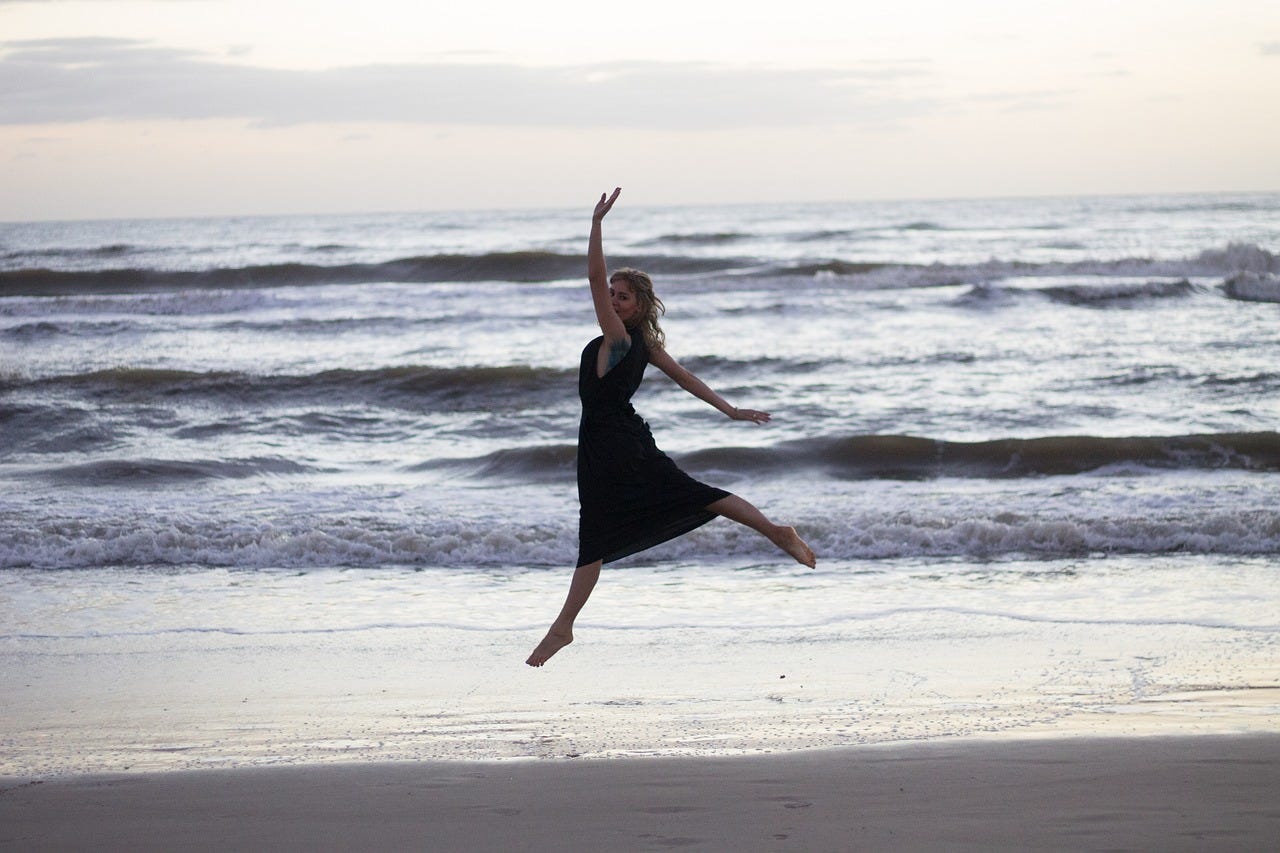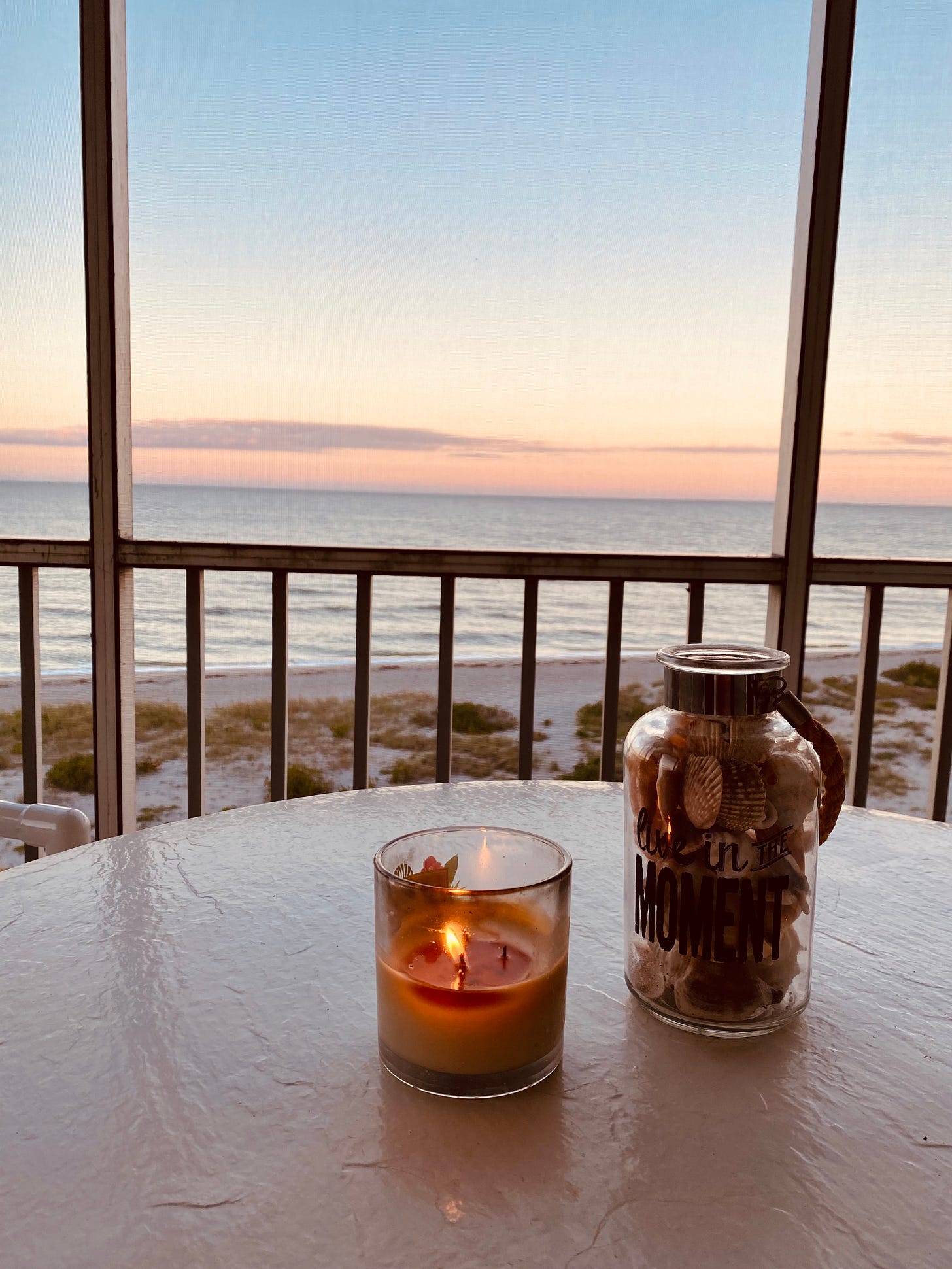The collateral damage when divorce and dementia caregiving collide
Just a month after leaving my 33-year-marriage, my mother with rapidly progressing dementia moved in with me and my "good daughter" tendencies went into hyperdrive.
I watched her every morning, the woman who dance-walked the beach at the water’s edge. Earbuds in, feet moving to the beat of something that moved her, she spun and twirled, smiling to herself. I envied her. I wanted to be her.
But I stood there, a few stories above the beach in the screened-in balcony, the caged bird who could not fly. My mother would soon wake, needing me to help her in the bathroom, get her dressed, administer her medication, coax her to eat breakfast and make sure she transited safely with her walker to her favorite armchair.
The rental of the beach condo for three months was a post-divorce gift to myself. I knew I was privileged to be able to afford it. When the landlord first showed it to me, I was giddy looking at the floor-to-ceiling windows in the bedroom, the 360-degree views from every vantage point in the apartment. I would fall asleep and wake each morning to the sound of the ocean. I imagined sitting at my desk, facing that view, working on my novel in progress and dreaming the next chapter I had so bravely stepped into after deciding to leave my marriage.

Two weeks into that idyll, my mother suffered a fall that led to hospitalization and rehab, as I shared in this newsletter, Caring for my mother with dementia is an act of love that nearly broke me. I didn’t consider any other possibility than having her move in with me. My beach condo would become her space to recover and perhaps I could still manage my own recovery in the process.
As it turned out, I was naive about balancing it all, as so many family caregivers are. The majority (80%) of people with Alzheimer's disease and related dementias are receiving care in their homes, according to the U.S. Centers for Disease Control. Each year, more than 16 million Americans provide more than 17 billion hours of unpaid care for family and friends with Alzheimer's disease and related dementias. About two-thirds of dementia caregivers are women. They experience higher rates of stress, burnout, anxiety, insomnia, high blood pressure, and physical and mental distress of every kind.
Parent-child role reversal
Time for myself became scarce as Mom’s need for help with the activities of daily life increased. I was no longer her child, in many ways—she was mine. She was my baby, right down to the Depends incontinence underpants that need to be changed several times a day, the occasional bedwetting, the baby monitor I installed in case she needed me during the night, the bedside alarm I hoped she would remember to press if she needed to get up and use the bathroom. She was my child in other ways, too: preparing her food and coaxing her to down a protein drink to put some weight on her slender frame. I would devise different ways to make the drink more appetizing, reminding me how I added chocolate powder to my daughters’ glasses of milk when they were little. Throughout the day, I needed to keep her fed, dry, safe, comfortable and entertained.
And it wasn’t just that I “needed” to do it. I wanted to do it. I had always had her constant love and care and so I felt it was my duty—my honor—to return that care when she most needed it. In those early weeks of full-time caregiving, I was certain that since my mother’s love for me had been constant and true, so must my love be for her—even if that meant putting aside my own needs.
Of course this wasn’t a sustainable position. I was ignoring many of my own needs. I was in the middle of a divorce. There were conference calls with my lawyer, a detailed financial affidavit I needed to complete, tense conversations with my husband where I despaired that we could reach a mutually satisfactory and fair agreement. I had a heavy workload as a freelance writer and editor. And I was working on finishing a novel.
Eldest-daughter syndrome
I was trying to do it all, with limited assistance from my siblings because while they cared very much for Mom and appreciated all I was doing, the circumstances of their own lives made it difficult for them to contribute more. In this, too, I was far from unique. In most families there is one sibling who shoulders most of the responsibility for caregiving. That can be a breeding ground for resentment. Over time, I learned to ask my siblings for more help and they were glad to oblige. The biggest challenge was for me to admit I needed help, as the “responsible” older sister who thought she was invincible—a situation I share with many eldest daughters, as writer Sarah Sloat points out in this recent Atlantic Monthly article:
Women are expected to be nurturers. Firstborns are expected to be exemplars. Being both is exhausting. Being an eldest daughter means frequently feeling like you’re not doing enough, like you’re struggling to maintain a veneer of control, like the entire household relies on your diligence. People have even coined a term for this: “eldest-daughter syndrome.”
Mourning a changing mother-daughter relationship
My relationship with my mother was changing, and a part of me mourned that loss when I gave myself time to feel it. Cognitively, she understood her limitations and accepted my help with grace and appreciation. She recognized everyone she loved (and still does), she could carry on conversations and make us laugh with her sense of humor. She’d often call out to me, “Is there anything I can do to help?” as if unaware of her own diminished circumstances, her reflexive kindness still intact.
Nearly every day we lived in the condo together, she would ask, knowing how much I love the beach, "Are you going for your walk?"
I didn’t have the heart to tell her that I couldn’t leave her. I said, "I hope so." I didn’t want to make her feel guilty by saying, "I can't leave you, Mom. I have to give up my cherished walk along the ocean, my healing and centering place, because you need me. You need me to keep you safe."
Sometimes my sister would be able to come over to be with mom, and my brother came for the Thanksgiving holiday last year. Those were precious times I could leave the condo and walk the beach. Eventually, recognizing the toll my “caged life” was taking on me, I also hired a home health aide from a local agency to come a few hours a week so I could grocery shop, run errands and grab a short walk. I felt fortunate we could afford that option. So many family caregivers of loved ones with dementia don’t have the financial resources to hire outside help.
But what I didn’t speak of to my siblings, and certainly not to my mother, was my deep yearning to be free, like the woman dancing on the beach. In those vulnerable, painful, strange months after I initiated the divorce, I was also grieving the loss of having this big-sky, big-ocean place to myself. Where at first the condo had invited spaciousness into my life just when I needed it, now it felt cramped. Never mind, I told myself: a loving daughter stays by her mother's side and makes sacrifices.
After a year of deep inner work, I now recognize that self-sacrifice and martyrdom are among my most frequent ego defense mechanisms, part of people-pleasing Amy. It is a coping strategy that inevitably leads to resentment—and of course, the resentment would come. Dementia is a cruel, unrelenting disease, and I felt more trapped as the months passed and my mother’s needs mounted.
It would take time for me to accept this truth—to really believe it: my loving mother would never want me to relinquish my own freedom and well-being in caring for her, especially after making the wrenching decision to divorce and start a new life for myself.
By the time I was ready to act, I knew she wasn’t capable of giving me permission to do what I needed to do.
I would have to give myself permission.
Questions for the comments: Do you find it hard to give yourself permission to do what you need to do for yourself, especially if you are a caregiver? What has helped you to grant yourself permission to show self-compassion in difficult circumstances?
Resources for caregivers
The New Old Age, New York Times column
Journalist Paula Span explores the unprecedented challenges posed by a rapidly aging population, including this recent article, The Only People Who Understand What a Caregiver Goes Through, about mentoring programs that bring together those just starting to care for family members with dementia and those who have been coping for some time.
Passages in Caregiving: Turning Chaos into Confidence by Gail Sheehy
In this essential guide, the acclaimed expert on the now aging Baby Boomer generation outlines nine crucial steps for effective, successful family caregiving, turning chaos into confidence during this most crucial of life stages.
Three Songs for 3D
…because music has always been and will always be a lifeline for me. What are your go-to songs in times of stress, when you most need to “let it all go”? Please share in the comments!
Divorce
Florence & the Machine, “Shake it out”
Regrets collect like old friends
Here to relive your darkest moments
I can see no way, I can see no way
And all of the ghouls come out to play
Dementia
Mother’s Love
The Vernon Spring reimagines “Mother’s Love”, originally by Emahoy Tsegué-Maryam Guèbrou.
Destiny
Cia, “Bird Set Free”
Clipped wings, I was a broken thing
Had a voice, had a voice but I could not sing
But there's a scream inside that we all try to hide
We hold on so tight, we cannot deny
Eats us alive, oh it eats us alive, oh






Thank you for sharing your experience, it is beautifully written. I am in the thick of experiencing the ambiguous and anticipatory grief of dementia with both of my parents, while attempting to stay present for my three young children and serving as legal guardian for my disabled brother. I have had (and continue) to work hard on giving myself permission to not please everyone, to outsource some care, and to care for myself.
Such a deep and thoughtful reflection of that extremely difficult period in your life! When you mentioned martyrdom, it reminded me of how my mother behaved in our family. She did all she could to take care of her own mother, but it led to a great deal of resentment. That didn't go well with us kids. It was a poor role model, and I grew to resent her for treating my grandma poorly through the years. So yes, your reflections on martyrdom hits home. I'm so glad you have done so much innerwork to come to a place where you can enjoy both inner and outer freedom, much more than the time when you were a "caged bird." All of what you pointed out about caregiving in America is so sadly true. Lastly, regarding permission, I struggled with it myself quite a good deal. But I'm practicing doing that this holiday season by speaking kindly to my inner children, who refused to visit mom because they were burnt out from being my mother's mom! I honored them and stood up for them. It is my inner Self who gives all of me the permission to do what is right and true for me, and also take the risk and responsibility for the choices "we" make together.